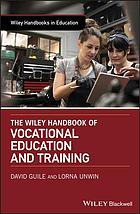

Most ebook files are in PDF format, so you can easily read them using various software such as Foxit Reader or directly on the Google Chrome browser.
Some ebook files are released by publishers in other formats such as .awz, .mobi, .epub, .fb2, etc. You may need to install specific software to read these formats on mobile/PC, such as Calibre.
Please read the tutorial at this link: https://ebookbell.com/faq
We offer FREE conversion to the popular formats you request; however, this may take some time. Therefore, right after payment, please email us, and we will try to provide the service as quickly as possible.
For some exceptional file formats or broken links (if any), please refrain from opening any disputes. Instead, email us first, and we will try to assist within a maximum of 6 hours.
EbookBell Team

4.0
76 reviewsA collection of the theories, practices, and policies of vocational education and training written by international experts.
Offers an in-depth guide to the theories, practices, and policies of vocational education and training (VET). With contributions from a panel of leading international scholars, the Handbook contains 27 authoritative essays from a wide range of disciplines. The contributors present an integrated analysis of the complex and dynamic field of VET.
Drawing on the most recent research, thinking, and practice in the field, the book explores the key debates about the role of VET in the education and training systems of various nations. Reveals how expertise is developed in an age of considerable transformation in work processes, work organization, and occupational identities. Also examines many of the challenges of vocational education and training such as the impact of digital technologies on employment, the demand for (re)training in the context of extended working lives, the emergence of learning regions and skill ecosystems, and the professional development of vocational teachers and trainers.
Written for students, researchers, and scholars in the fields of educational studies, human resource development, social policy, political economy, labor market economics, industrial relations, sociology.